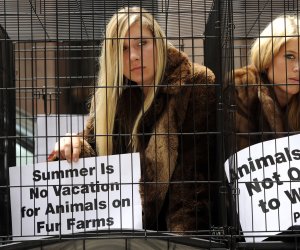Topic: PETA
People for the Ethical Treatment of Animals (PETA) is an American animal rights organization based in Norfolk, Virginia, and led by Ingrid Newkirk, its international president. A non-profit corporation with 300 employees and two million members and supporters, it claims to be the largest animal rights group in the world. Its slogan is "animals are not ours to eat, wear, experiment on, or use for entertainment."[1] Founded in March 1980 by Newkirk and fellow animal rights activist Alex Pacheco, the organization first caught the public's attention in the summer of 1981 during what became known as the Silver Spring monkeys case, a widely publicized dispute about experiments conducted on 17 macaque monkeys inside the Institute of Behavioral Research in Silver Spring, Maryland. The case lasted ten years, involved the only police raid on an animal laboratory in the United States, triggered an amendment in 1985 to that country's Animal Welfare Act, and established PETA as an internationally known organization.[2] Since then, in its campaigns and undercover investigations, it has focused on four core issues—opposition to factory farming, fur farming, animal testing, and animals in entertainment—though it also campaigns against fishing, the killing of animals regarded as pests, the keeping of chained backyard dogs, cock fighting, dog fighting, and bullfighting.[3] The group has been the focus of criticism from inside and outside the animal rights movement. Newkirk and Pacheco are seen as the leading exporters of animal rights to the more traditional animal protection groups in the United States, but sections of the movement nevertheless say PETA is not radical enough—law professor Gary Francione calls them the new welfarists, arguing that their work with industries to achieve reform makes them an animal welfare, not an animal rights, group.[4] Newkirk told Salon in 2001 that PETA works toward the ideal, but tries in the meantime to provide carrot-and-stick incentives.[5] There has also been criticism from feminists within the movement about the use of scantily clad women in PETA's anti-fur campaigns, and criticism in general that the group's media stunts trivialize animal rights. Newkirk's view is that PETA has a duty to be "press sluts".[6] Outside the movement, the confrontational nature of PETA's campaigns has caused concern, as has the estimated 85% of animals it euthanizes.[7] PETA was further criticized in 2005 by United States Senator Jim Inhofe for having given grants several years earlier to Animal Liberation Front (ALF) and Earth Liberation Front (ELF) activists, two groups that the Federal Bureau of Investigation has identified as agents of domestic terrorism.[8] PETA responded that it has no involvement in ALF or ELF actions and does not support violence, though Newkirk has elsewhere made clear that she supports the removal of animals from laboratories and other facilities, including as a result of illegal direct action.[9]
It uses material from the Wikipedia article "PETA."





 PETA serves vegan hot dogs on Capitol Hill
PETA serves vegan hot dogs on Capitol Hill  Outrageous PETA campaigns
Outrageous PETA campaigns  PETA holds anti-fur demonstration
PETA holds anti-fur demonstration  PETA promotes Tofurky for Thanksgiving
PETA promotes Tofurky for Thanksgiving  Pamela Anderson attends PETA photo call
Pamela Anderson attends PETA photo call  PETA hands out egg-free cupcakes in D.C.
PETA hands out egg-free cupcakes in D.C.